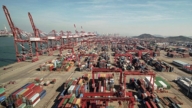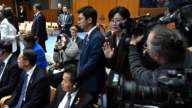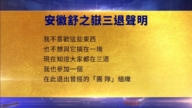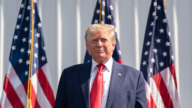【新唐人2011年10月27日讯】南海周边国家的争端最近剑拔弩张。中共媒体《人民日报》属下的《环球时报》10月25号社论声称,中国不能只会谈判,必要时应当“杀一儆百”。不过,当天下午,中共外交部急忙澄清,表示中方奉行的是和平发展战略。这两种截然不同的腔调引起外界关注。
《环球时报》10月25的社论批评菲律宾、越南等国家的主权诉求是“趁火打劫”,认为这些国家“好像有了美国撑腰,它们就都有了让中国屈服的权力和本事。”
一直以来,中国、越南、菲律宾、汶莱、马来西亚和台湾等都宣称,对蕴藏丰富石油和天然气的南中国海地区拥有全部或是部分主权。
社评宣称,“中国不能只会谈判,必要时应当“杀一儆百”。社评还说,只有中国一个国家是冷静的,但将来的大势是“中国将不得不做调整”。
这篇语气强硬的社论同时在《环球时报》的英文版刊登。
同一天下午,中共外交部发言人姜瑜在记者招待会上回应表示,媒体有编辑、评论权利,并认为他们会用“真实、客观、负责任的态度进行报导”。
同时,她还重申,中国致力于“和平解决”南中国海争端,并与地区邻国进行“和平发展”与合作。
《中国事务》主编 伍凡:“一个是通过外交部的,是官方的,四平八稳的,尽讲和平的、好听的话。中国的动作是掩护的,从官方上你看不出来,而媒体上透露一点 ,这个媒体是讲环球时报这类媒体,5毛党那就更嚣张了,所以这个图像你看起来可能就看不明白,究竟中国什么立场。”
伍凡认为,中共现在是在放烟雾、掩护它背后的行动,大家需要进行观察。
最近,美国新任国防部长帕内塔首次到访亚洲。25号,他与日本首相野田佳彦在首相官邸进行了会谈。双方一致表示,将进一步深化美日同盟,加强亚太地区的安全保障。
与此同时,香港《东方日报》报导,美国宣布向印尼捐赠三十架F十六战机,韩国向菲律宾捐赠海军军舰。日本与越南签署防务合作条约之外,近期又计划向荷兰订购四艘轻型护卫舰,积极在区内部署军舰。分析认为,东南亚各国与日韩的结盟,已经形成了共同围堵中国的趋势。
另一方面,韩国日前扣押的中国渔民,经缴纳罚款后已陆续离开。至于菲律宾在礼乐滩附近扣押的二十五艘中国舢舨,至今没有归还。
时事评论员文昭指出,随着国际形势的变化,全球一体化的步伐加快,南海作为一个国际海上通道,不仅对中国,对整个亚太地区以至于全球经济都很重要。
时事评论员文昭:“南海那个地方已经失去了通过军事手段解决的可能性,因为你要这样去做,等于去挑战国际规则,相当于对整个全球的经济安全都会有影响,那么大国的干预是必然的。从最近的做法来看,东南亚的国家他们自己一方面加强抱团,他们以地区联盟的方式对抗中共压力,另一方面他们积极引入大国的介入,目地都是让这个地方,让大国更深的介入,这样让中共方面投鼠忌器。”
文昭认为,南海问题的解决只能是各个国家,抱着诚恳的态度,各自做出不同程度的妥协,通过一个共建规则的方式去解决。也就是说,一个国家想通过武力去把其他国家清除出去,已经没有这个国际条件了。
新唐人记者梁欣、李静、郭敬采访报导。
****************
CCP Media : China Should “Kill One To Warn One Hundred"
The countries in the South China Sea regions recently
have come close to war. Global Times under People’s Daily,
CCP’s (Chinese Communist Party) mouthpiece, claimed
in an editorial dated 25th October that China cannot only
negotiate, but should “kill one to warn one hundred",
when necessary. However, on the same day in the
afternoon, CCP Foreign Ministry rushed to clarify that
China pursued a strategy of peaceful development.
The opposing tones drew public attention.
On 25th October, Global Times criticized in an editorial that
the appeals for sovereignty by the Philippines, and Vietnam
among others are fishing in troubled waters.
The editorial asserts that “as if they have U.S. backing,
they believe that they have the authority and power
to force China to bow down."
All along, China, Vietnam, Philippines, Brunei, Malaysia and
Taiwan, all declared that they have an overall or partial
sovereignty over the South China Sea region, which contains
abundant reserves of oil and natural gas.
The editorial claims that, “China cannot only negotiate,
but should ‘kill one to warn one hundred’ when necessary."
The article said that China is the only country remaining
calm, but in view of the general trend, “China will have
to adjust itself to this reality."
The harsh-tone editorial was also published in English.
On same day afternoon, Jiang Yu, CCP Foreign Ministry
spokeswoman, claimed at a news conference that
“the media has editing, commentary rights," and
believed that they will “carry on the reporting in
a real, objective and responsible manner."
Jiang Yu reiterated China’s commitment to “peacefully
resolving” disputes over the South China Sea, and will
pursue “peaceful development" and cooperation with
neighboring countries.
Wu Fan (Editor-in-chief, China Affairs): “The official remarks
of CCP Ministry of Foreign Affairs presented cautiously,
talking up peace with nice words.
The CCP official claims are a cover, but some message was
revealed by the media, such as Global Times and the like.
The 50 Cent Party presented more arrogantly.
So you might be confused with the CCP’s whole picture so far,
That’s exactly what China’s position is."
Wu Fan believes that the CCP is covering up behind the scenes.
This needs more time to observe.
Recently, Leon Panetta, 23rd U.S. Secretary of Defense
paid his first visit to Asia. On 25th October, he held a meeting
with Japanese Prime Minister Yoshihiko Noda.
Both parties agreed to further deepen the US-Japan alliance
to strengthen Asia-Pacific security.
Meanwhile, Hong Kong’s Oriental Daily reported that
the U.S. announced a donation of 30 F-16 fighters to
Indonesia. South Korea donated naval vessels to
the Philippines. Besides a defense cooperation
with Vietnam, Japan recently plans to place an order of
four corvettes with Holland.
Analysts comment that the alliances made by Japan,
South Korea and Southeast Asian countries have
formed a situation to jointly wall off China.
On the other hand, Chinese fishermen detained
in South Korea have begun to leave after paying the fines.
25 sampans that were detained by the Philippines
have not yet been returned.
Commentator Wen Zhao pointed out that international
situations have accelerated the pace of globalization.
The South China Sea, as an international sea lane,
is important not only to China, but to the entire
Asia-Pacific region as well as the global economy.
Wen Zhao (Commentator): " It has ruled out the possibility
of using direct force to resolve disputes over
the South China Sea. Because applying military means is
equal to challenging the international rules.
It will impact the entire global economy,
inevitably triggering major powers’ intervention.
Recently, Southeast Asian countries strengthened ties,
forming a regional alliance to counter the pressure of the CCP.
They have obtained major powers’ involvement
in the region. Their goal is to restrain the CCP.
Wen Zhao comments that the only solution to disputes
over the South China Sea is made by reaching
a compromise among countries concerned,
with a sincere attitude to jointly set up a rule.
In other words, there is no such condition for a country
to resort to force to clear out other nations.
NTD reporters Liang Xin, Li Jing and Guo Jing.






























